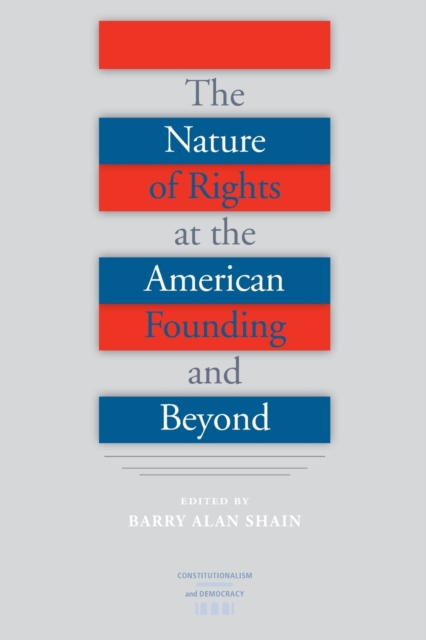The Nature of Rights at the American Founding and Beyond

The Nature of Rights at the American Founding and Beyond
Americans have been claiming and defending rights since long before the nation achieved independence. But few Americans recognize how profoundly the nature of rights has changed over the past three hundred years. In The Nature of Rights at the American Founding and Beyond, Barry Alan Shain gathers together essays by some of the leading scholars in American constitutional law and history to examine the nature of rights claims in eighteenth-century America and how they differed, if at all, from today's understandings. Was America at its founding predominantly individualistic or, in some important way, communal? Similarly, which understanding of rights was of greater centrality: the historical "rights of Englishmen" or abstract natural rights? And who enjoyed these rights, however understood? Everyone? Or only economically privileged and militarily responsible male heads of households?
The contributors also consider how such concepts of rights have continued to shape and reshape the American experience of political liberty to this day. Beginning with the arresting transformation in the grounding of rights prompted by the American War of Independence, the volume moves through what the contributors describe as the "Founders' Bill of Rights" to the "second" Bill of Rights that coincided with the Civil War, and ends with the language of rights erupting from the horrors of the Second World War and its aftermath in the Cold War. By asking what kind of nation the founding generation left us, or intended to leave us, the contributors are then able to compare that nation to the nation we have become. Most, if not all, of the essays demonstrate that the nature of rights in America has been anything but constant, and that the rights defended in the late eighteenth century stand at some distance from those celebrated today.
Contributors: Akhil Reed Amar, Yale University * James H. Hutson, Library of Congress * Stephen Macedo, Princeton University * Richard Primus, University of Michigan * Jack N. Rakove, Stanford University * John Phillip Reid, New York University * Daniel T. Rodgers, Princeton University * A. Gregg Roeber, Pennsylvania State University * Barry Alan Shain, Colgate University * Rogers M. Smith, University of Pennsylvania * Leif Wenar, University of Sheffield * Gordon S. Wood, Brown University
PRP: 232.50 Lei
Acesta este Prețul Recomandat de Producător. Prețul de vânzare al produsului este afișat mai jos.
186.00Lei
186.00Lei
232.50 LeiLivrare in 2-4 saptamani
Descrierea produsului
Americans have been claiming and defending rights since long before the nation achieved independence. But few Americans recognize how profoundly the nature of rights has changed over the past three hundred years. In The Nature of Rights at the American Founding and Beyond, Barry Alan Shain gathers together essays by some of the leading scholars in American constitutional law and history to examine the nature of rights claims in eighteenth-century America and how they differed, if at all, from today's understandings. Was America at its founding predominantly individualistic or, in some important way, communal? Similarly, which understanding of rights was of greater centrality: the historical "rights of Englishmen" or abstract natural rights? And who enjoyed these rights, however understood? Everyone? Or only economically privileged and militarily responsible male heads of households?
The contributors also consider how such concepts of rights have continued to shape and reshape the American experience of political liberty to this day. Beginning with the arresting transformation in the grounding of rights prompted by the American War of Independence, the volume moves through what the contributors describe as the "Founders' Bill of Rights" to the "second" Bill of Rights that coincided with the Civil War, and ends with the language of rights erupting from the horrors of the Second World War and its aftermath in the Cold War. By asking what kind of nation the founding generation left us, or intended to leave us, the contributors are then able to compare that nation to the nation we have become. Most, if not all, of the essays demonstrate that the nature of rights in America has been anything but constant, and that the rights defended in the late eighteenth century stand at some distance from those celebrated today.
Contributors: Akhil Reed Amar, Yale University * James H. Hutson, Library of Congress * Stephen Macedo, Princeton University * Richard Primus, University of Michigan * Jack N. Rakove, Stanford University * John Phillip Reid, New York University * Daniel T. Rodgers, Princeton University * A. Gregg Roeber, Pennsylvania State University * Barry Alan Shain, Colgate University * Rogers M. Smith, University of Pennsylvania * Leif Wenar, University of Sheffield * Gordon S. Wood, Brown University
Detaliile produsului









